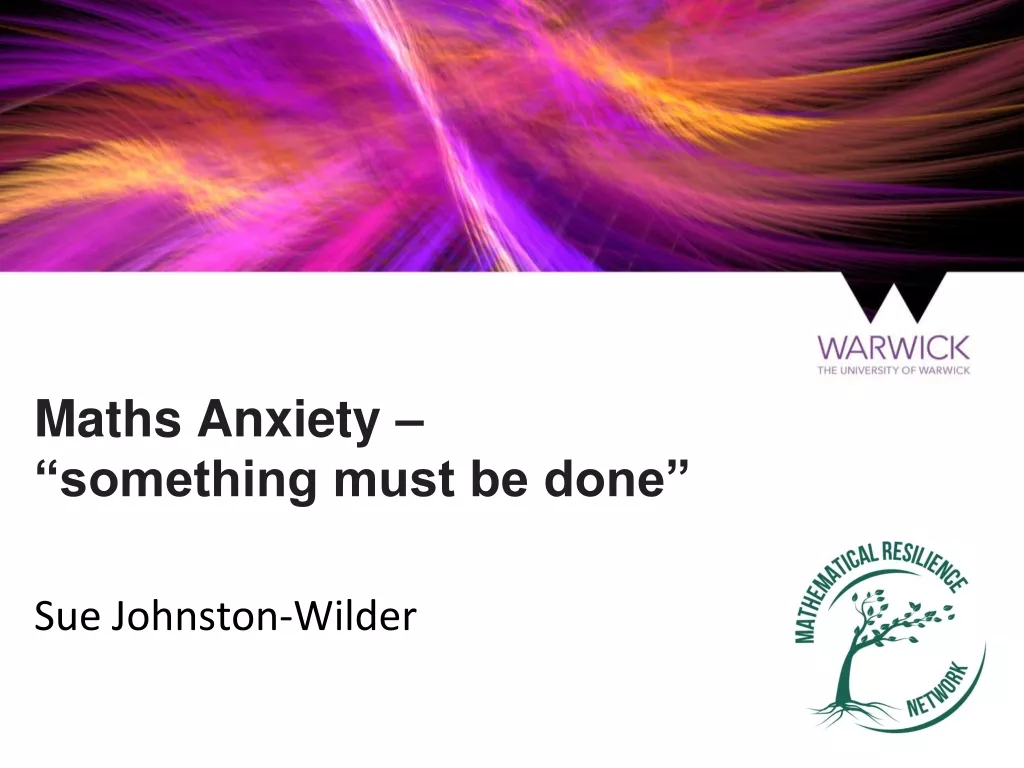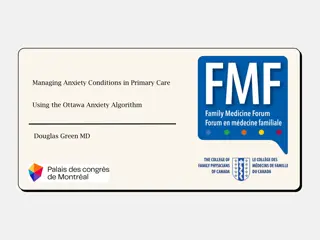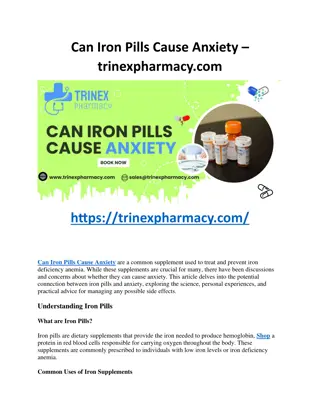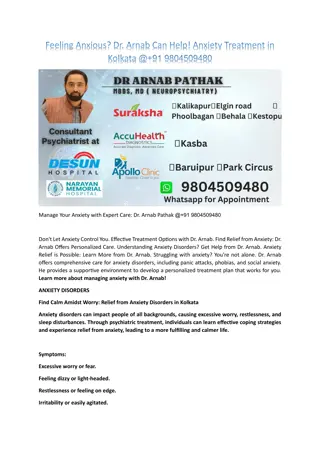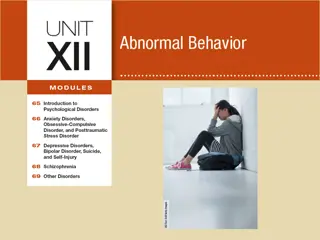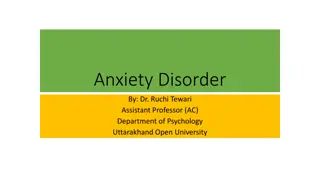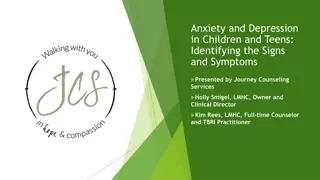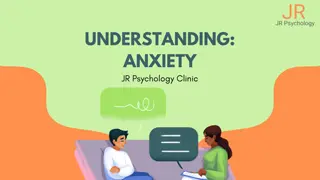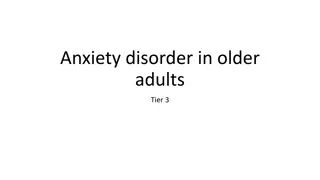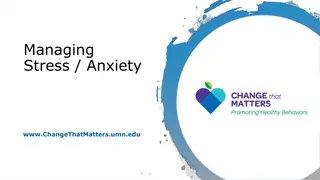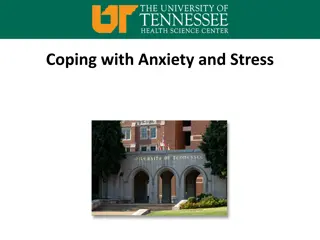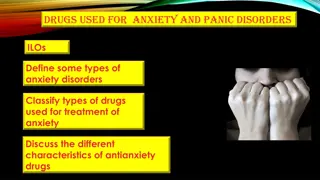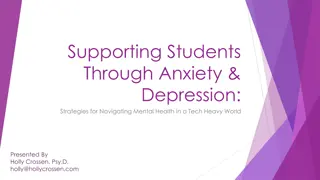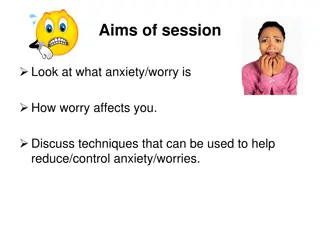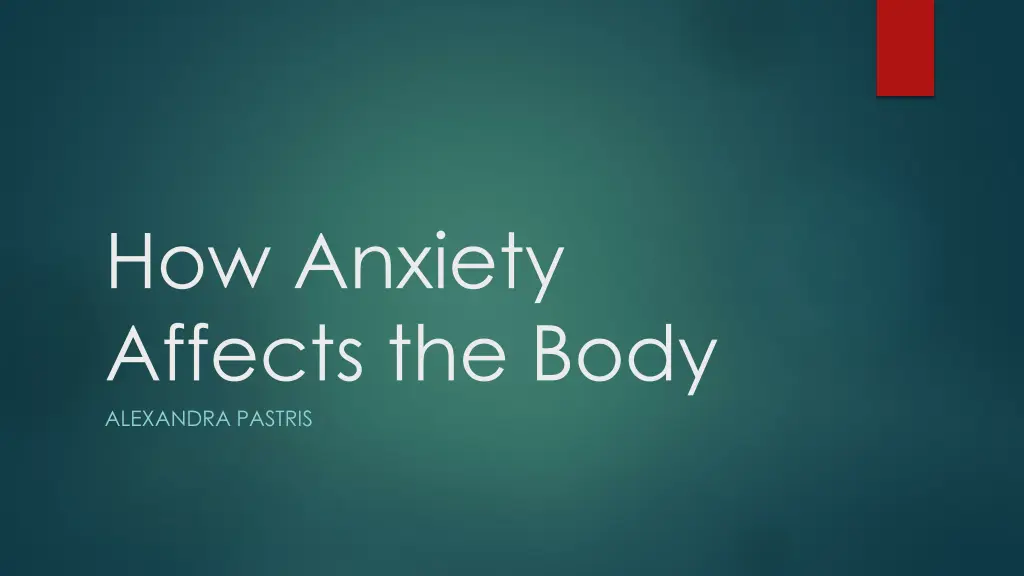
Understanding the Physical Effects of Anxiety on the Body
Learn how anxiety impacts the body with symptoms such as headaches, insomnia, rapid breathing, heart palpitations, stomachaches, high blood sugar, and tense muscles. Explore the connection between anxiety and physical health, including increased heart rate, muscle tension, and rapid breathing patterns, which can have detrimental effects on overall well-being.
Download Presentation

Please find below an Image/Link to download the presentation.
The content on the website is provided AS IS for your information and personal use only. It may not be sold, licensed, or shared on other websites without obtaining consent from the author. If you encounter any issues during the download, it is possible that the publisher has removed the file from their server.
You are allowed to download the files provided on this website for personal or commercial use, subject to the condition that they are used lawfully. All files are the property of their respective owners.
The content on the website is provided AS IS for your information and personal use only. It may not be sold, licensed, or shared on other websites without obtaining consent from the author.
E N D
Presentation Transcript
How Anxiety Affects the Body ALEXANDRA PASTRIS
Headaches Insomnia Rapid Breathing Heart pounding Stomachache High Blood Sugar Tense Muscles
Headaches Headaches from constant worry and stress are common. A frequent feeling of uncertainty can occur and you may have difficult concentrating which will increase the headache symptom. Irritability and constant worry can increase your overall feelings. If symptoms increase this can lead to lightheadedness.
Headaches Insomnia Rapid Breathing Heart pounding Stomachache High Blood Sugar Tense Muscles
Insomnia Triggers a fight or flight response, releasing stress hormones, which can make it difficult to relax or fall asleep Racing Thoughts: Overthinking and an overload of thoughts makes it harder for the mind to shut down
Headaches Insomnia Rapid Breathing Heart pounding Stomachache High Blood Sugar Tense Muscles
Increased Heartrate Heartbeat may quicken in pace and intensity and can occur with panic attacks Increased Adrenaline: A release of a hormone that accelerates the heart rate to help the body respond quickly to perceived threats Muscle tension: Tension in the chest and other muscles will contribute to an increased or irregular heartbeat
Headaches Insomnia Rapid Breathing Heart pounding Stomachache High Blood Sugar Tense Muscles
Rapid Breathing Rapid, shallow breathing can be more intense with increased anxiety. Anxiety causes the body to feel as if it needs more oxygen, which increases your breathing pattern.
Headaches Insomnia Rapid Breathing Heart pounding Stomachache High Blood Sugar Tense Muscles
High Blood Sugar The adding up of all these symptoms stimulates the sympathetic nervous system, which controls automatic functions such as blood pressure. Anxiety causes muscle tightness which tightens your blood vessels and limits your blood flow, which leads to an increase in your blood sugar.
Headaches Insomnia Rapid Breathing Heart pounding Stomachache High Blood Sugar Tense Muscles
Stomachache Stomach pains may be accompanied by nausea and diarrhea. Slowed digestion: Can slow down the digestive process, which can also lead to feelings of bloating or constipation as well. The gut and brain are strongly connected, so anxiety can disrupt normal gastrointestinal functioning (stomachaches, nausea ,etc.). Changes in appetite: Anxiety can either lead to overeating or under eating which can irritate the stomach and cause pain.
Headaches Insomnia Rapid Breathing Heart pounding Stomachache High Blood Sugar Tense Muscles
Tense Muscles Triggers fight or flight mode which prepares the muscles for quick action causing them to contract and tense up in response to danger . Can cause muscles to remain tense for an extended period of time , which can lead to chronic muscle tightness, pain, or discomfort. Heightened sensitivity to pain: Increases the perception of physical discomfort, making someone more aware of muscle tightness or stiffness.
Headaches Insomnia Rapid Breathing Heart pounding Stomachache High Blood Sugar Tense Muscles

